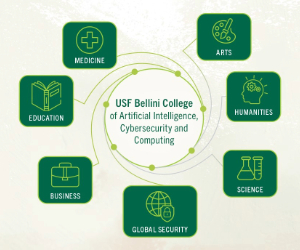Building a College for the Future
How this interdisciplinary AI and cybersecurity college was created
The University of South Florida’s Bellini College of Artificial Intelligence, Cybersecurity and Computing progressed from concept to reality at a speed more familiar to the business world than higher ed.
Shortly after settling into his new role at USF, Provost and Executive Vice President Prasant Mohapatra started the process of developing a stand-alone college for AI and cybersecurity — now known as the Bellini College — with the goal of putting USF at the forefront of recognizing the need for AI and cybersecurity to become part of almost every college discipline.
Mohapatra assembled an interdisciplinary task force to establish a plan to create, fund, staff and manage the new academic program. He provided minimal guidance to the task force to ensure decisions emerged from a collaborative process but emphasized that the college would bring together AI and cybersecurity with a focus on application over theory.
“The new college will not be a version of computer science,” he told the task force. “It’s sociology, health sciences, nursing and many other fields coming together to leverage advances in technology — particularly in AI and cybersecurity — for bigger, broader applications.”
Given latitude by Mohapatra to find the best model for the new college, the task force began work last spring and ultimately recommended a hub-and-spoke academic structure. The belief was this would eliminate silos and underscore the interdisciplinary nature of AI and cybersecurity, resulting in university-wide collaboration. It would also allow most of the 200-plus faculty currently working in areas that comprise the new college to remain in their home units.

The question of governance was more challenging for the task force, which eventually landed on a flat structure that is similar to models currently used in other USF colleges. Flat governance would make it possible to add new programs in areas such as quantum computing and digital twins while promoting collaboration and quicker decision-making.
In its recommendations, task force members wrote, “The relationship between AI, cybersecurity and computing reflects a rapidly evolving landscape where traditional departmental boundaries are increasingly blurred. These fields are deeply interconnected, with advancements in one area often propelling developments in others.”
Breakthroughs occur at a dazzling pace in these fields. Mohapatra and USF’s leadership understood that they needed to move quickly on launching the new college. At the same time, it was important to balance a sense of urgency with the need to move deliberately enough to ensure faculty and student concerns and questions were sought and considered.
In fall 2025, the Bellini College will start preparing students for career success in high-demand fields.
Our case study explains key takeaways and best practices for universities interested in starting a similar program and describes Mohapatra’s approach to developing an innovative college. Download it for free to learn more about our college for the future.

